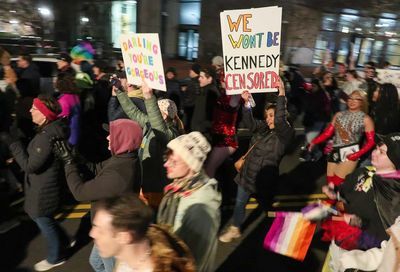Is ENDA Dead?
Despite long odds, lobbying efforts continue in lame duck session

In the face of a red wave that delivered Republicans control of the Senate and their largest House majority since at least World War II, lobbying efforts are continuing on Capitol Hill during the lame duck session for legislation that would outlaw LGBT workplace discrimination by most employers.
Several LGBT-rights organizations, particularly those focused on winning support among Republican lawmakers, confirmed to Metro Weekly that lobbying efforts on the Employment Non-Discrimination Act will continue until the 114th Congress is sworn in this January, while other groups, including the nation’s largest LGBT-rights organization, have gone silent.
“We are committed to and working to see ENDA passed this year, in this Congress,” said Campbell Spencer, campaign manager for Americans for Workplace Opportunity, an umbrella coalition of several LGBT-rights groups that has previously deployed GOP lobbying efforts by former Republican Sen. Norm Coleman (Minn.) and former Republican Reps. Tom Reynolds (N.Y.) and Deborah Pryce (Ohio). “If that does not happen, we will determine at that time our strategy moving forward.”
Groups such as Log Cabin Republicans, the Paul Singer-backed American Unity Fund and Freedom to Work are also continuing lobbying efforts. On Nov. 12, Gregory T. Angelo, the executive director of Log Cabin Republicans, and Christian Berle, the legislative director for Freedom to Work, met with members of House Speaker John Boehner’s staff to discuss the bill.
“Freedom to Work has teamed with Log Cabin Republicans on a series of high-level lobby meetings with Speaker Boehner’s office and other members of Republican Leadership where we have made the case for allowing a vote on LGBT workplace protections,” Berle said. “In fact, in the past year Freedom to Work has visited every single Republican congressional office to make the case for passing LGBT workplace protections.”
Since ENDA’s passage by a 64-32 Senate vote last November, the bill has been blocked by Republican leadership in the House of Representatives.
The meeting with Boehner’s office comes as a growing number of GOP supporters in the House have articulated a strategy that would attach the legislation as an amendment to a broader defense authorization bill. Three of ENDA’s eight Republican cosponsors — Reps. Charlie Dent (Penn.), Chris Gibson (N.Y.) and Ileana Ros-Lehtinen (Fla.) — have publicly endorsed the strategy, although Democrats have remained quiet. Last month, Gibson’s chief of staff told Metro Weekly that the New York Republican and member of the House Armed Services Committee is “advocating as a cosponsor of the bill to bring on more supporters and talking to colleagues who haven’t signed on.”
“We have always supported attaching ENDA to [the National Defense Authorization Act] as an option on the table,” Angelo said.
Jeff Cook-McCormac, a senior advisor to American Unity Fund, said they will “continue to engage legislators in efforts to advance non-discrimination legislation in the lame duck and the new Congress.” Cook-McCormac also credited Republican lawmakers for “taking the lead and working to identify every opportunity to advance the principle that Americans should be judged on their merit and hard work in the workplace.”
Such talk has pushed the conservative Heritage Foundation to list ENDA as a “lame duck threat,” although a representative from the group told Metro Weekly they do not perceive ENDA as viable during the lame duck session.
Meanwhile, a rare legislative maneuver announced by House Democrats less than two months before the midterm elections appears to have stalled. In September, the lead sponsor of ENDA in the House of Representatives, Rep. Jared Polis (D-Colo.), filed a discharge petition in an attempt to force a vote on the bill. ENDA supporters need 218 signatures in order to bypass Republican leadership and bring a vote on the bill. The petition has 190 signatories — all of whom are Democrats — with the last name added to the petition on Sept. 18. GOP supporters of ENDA criticized the petition as a theatrical move before an election and accused Democrats of “moving the goal posts.”
The filing by Polis would also amend the version of ENDA approved by the Senate by narrowing the bill’s religious exemption, a provision of the bill that has been critical in securing Republican support. ENDA passed the Senate last year with the support of 10 Republicans — the most Senate Republicans to ever vote for a piece of LGBT-rights legislation — in part due to the religious exemption. When the religious exemption was adopted with a 402-25 vote in 2007 as an amendment in the House proposed by Rep. George Miller (D-Calif.), it received the backing of not only Democrats like Nancy Pelosi, Barney Frank and Tammy Baldwin, but Republicans like Boehner, Eric Cantor and Paul Ryan. Sen. Orrin Hatch (R-Utah) specifically cited the religious exemption when he became one of three Republicans on the Senate Health, Education, Labor & Pensions Committee to vote in favor of ENDA in July 2013.
Despite having previously supported the bill as written, this summer seven organizations withdrew their support for ENDA due to the scope of the religious exemption: The National LGBTQ Task Force, American Civil Liberties Union (ACLU), Gay & Lesbian Advocates & Defenders (GLAD), Lambda Legal, National Center for Lesbian Rights (NCLR), Transgender Law Center and Pride at Work. Those groups now appear to have turned their focus to a broader LGBT civil rights bill, expected to be introduced in the next Congress, that would integrate sexual orientation and gender identity fully into the nation’s civil rights laws.
Although the Human Rights Campaign has vowed to back a comprehensive LGBT civil rights bill that would include protections for housing, public accommodations, credit, education and employment, HRC President Chad Griffin said in September his organization would continue work to secure support for ENDA.
“Today we can’t get a vote in the House on ENDA, and just as it relates to employment protections. Now, having said that, there are folks who said we couldn’t get this done in the Senate, and we were able to count to over 60 in the United States Senate,” Griffin told The Advocate’s Rebecca Juro. “I will not give up. I will not give up until the last day of this Congress, and we will fight like hell to move every single vote we can. And we are organizing today in over 30 congressional districts all over this country. We’ve invested millions of dollars and thousands of volunteer and staff hours all across this country.”
Despite those remarks by Griffin, HRC repeatedly declined to comment for this story or to confirm whether HRC lobbying efforts on ENDA are continuing in the lame duck session. The National Center for Transgender Equality also did not respond to requests for comment.
Both strategies to advance ENDA emerging from the Democratic and Republican sides of the aisle have little chance of succeeding, but they illustrate a movement at odds over the best path forward.
“ENDA is dead for this Congress. Put a fork in it; it’s dead,” said one activist close to ENDA lobbying efforts. “The next few years will really be building years for the comprehensive bill in Congress. That’s the absolute truth. Introducing the legislation will be a major hallmark. Building the coalition that’ll support it will take time, money and a lot of conversations. It’ll all be brand new for people. But here’s the bottom line: there’s no chance this legislation will move until we have Democratic majorities in both houses of Congress and a president willing to take a hands-on leadership role to get it passed. That’s why I believe that the election of Hillary Clinton will consume our imagination, attention and dollars over the next two years.”
Indeed, some have speculated that attempts to amend the Civil Rights Act to include LGBT Americans could take a decade or more. But others have not been so quick to pronounce ENDA dead.
“There are already Republicans looking to introduce ENDA in the next Congress. TBD on the religious exemption,” said Gregory T. Angelo of Log Cabin Republicans, who noted that there is still a chance — “albeit a long shot” — that ENDA is passed this year as part of a larger bill.
If Republicans were to separately introduce ENDA next year, it could prove to be a remarkable moment in American politics, pitting a more conservative LGBT-rights bill once broadly backed by advocates against sweeping legislation that would confer LGBT Americans the same protections afforded to minorities such as women and African-Americans in areas extending beyond employment.
“It’s not dead,” Angelo added. “We’ll see what the lay of the land looks like come January next year, but I don’t think you’ve heard the last of ENDA.”
Support Metro Weekly’s Journalism
These are challenging times for news organizations. And yet it’s crucial we stay active and provide vital resources and information to both our local readers and the world. So won’t you please take a moment and consider supporting Metro Weekly with a membership? For as little as $5 a month, you can help ensure Metro Weekly magazine and MetroWeekly.com remain free, viable resources as we provide the best, most diverse, culturally-resonant LGBTQ coverage in both the D.C. region and around the world. Memberships come with exclusive perks and discounts, your own personal digital delivery of each week’s magazine (and an archive), access to our Member's Lounge when it launches this fall, and exclusive members-only items like Metro Weekly Membership Mugs and Tote Bags! Check out all our membership levels here and please join us today!
























You must be logged in to post a comment.